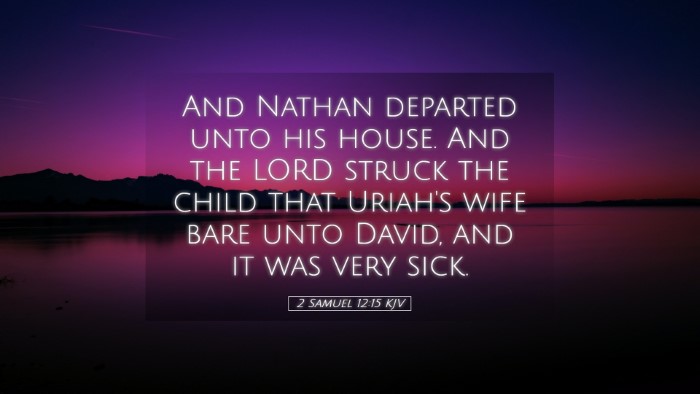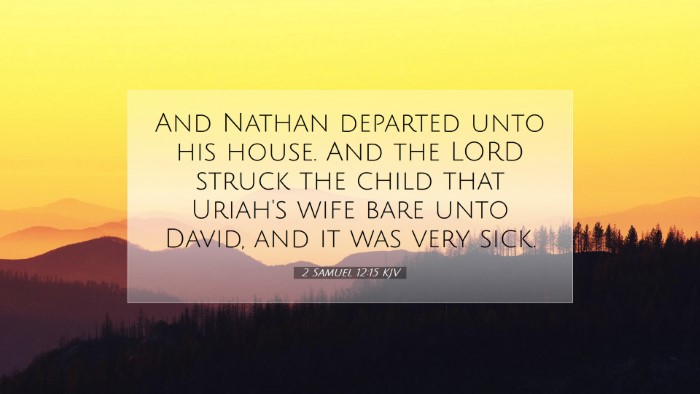Commentary on 2 Samuel 12:15
2 Samuel 12:15 is a pivotal verse following the narrative of King David's sin with Bathsheba and the subsequent confrontation by the prophet Nathan. This verse highlights the immediate consequences of David's sin, particularly focusing on the divine judgment pronounced against his household.
Verse Context
“And Nathan departed unto his house. And the Lord struck the child that Uriah’s wife bare unto David, and it was very sick.” (2 Samuel 12:15)
Summary of Commentary Insights
Divine Judgment and Mercy
Matthew Henry emphasizes that the sickness of the child is a direct consequence of David's sin, illustrating the principle of sowing and reaping (Galatians 6:7). This event serves to remind us that while God is merciful, He is also just, and sin has tangible consequences.
The Role of Prophecy and Accountability
Albert Barnes points out that Nathan's role as a prophet was critical in demonstrating God's displeasure towards David's actions. Nathan's prophecy is not only a warning but also a means through which God holds David accountable. The striking of the child serves as an emblem of judgment, intertwining faithfulness and consequence.
Understanding God's Sovereignty
Adam Clarke comments on the significance of God’s sovereignty in the process of discipline. The notion that God struck the child rather than David directly represents a complex interaction between divine sovereignty and human action. This signals that God uses situations to achieve His purpose, and although painful, His actions stem from His holiness.
Theological Implications
- The Nature of Sin: The passage invites reflection on the pervasive nature of sin and its consequences. The death of the innocent child points to the tragic reality that sin does not only affect the sinner but also those around them.
- God's Justice: The harshness of the punishment reflects God’s justice. Although God forgives, the repercussions of sin are often profound and serve to prevent future transgressions.
- The Weight of Leadership: Given David's position as king, his actions have amplifying effects. This underlines the theme that leaders are held to a higher standard, as their sins can have far-reaching implications.
Practical Applications
For pastors and church leaders, this passage serves as a reminder of the seriousness of their role and the potential consequences of their actions. Here are key takeaways:
- Encouragement towards Accountability: Leaders must foster an environment where accountability is both expected and embraced. This is demonstrated through Nathan’s confrontation of David.
- Dealing with Consequences: When sin leads to consequences, the faithful must approach the matter with repentance and a desire to restore. David's response to the seriousness of his sin teaches us about humility.
- Communicating God’s Justice: While sharing the message of grace, it is essential not to neglect the message of God’s justice. Pastors should teach their congregations about the importance of divine accountability.
Conclusion
The narrative surrounding 2 Samuel 12:15 encapsulates profound truths regarding sin, consequence, and the complex dynamics of divine judgment and mercy. It urges a serious contemplation of moral integrity, the significance of leadership, and an unwavering commitment to God’s holiness.


